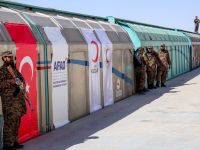A Turkish parliamentary commission has backed a bill which would offer partial amnesty to many political prisoners but leave Kurdish rebel leader Abdullah Ocalan still facing the death penalty.
Under the proposal approved overnight by the constitutional commission and reported by the official Anatolian news agency and by Turkish television, the moratorium on executions in force since 1984 would continue, except for those sentenced for "terrorism".
Ocalan, leader of the Kuridstan Workers Party (PKK), was sentenced to death in June 1999 for treason and separatism under the terms of a Turkish law covering "terrorist" acts.
Turkey suspended his execution pending a ruling by the European Court of Human Rights, where Ocalan had lodged an appeal against his sentence.
The abolition of the death penalty is one of the conditions for Turkey's entry into the European Union.
The bill is to be debated by a full session of parliament Friday. If it is passed, it must still be approved by President Ahmet Necdet Sezer.
The proposed legislation is a subject of concern to the Muslim former prime minister Necmettin Erbakan, sentenced to a year in prison for inciting racial and religious hatred. The sentence has not yet been put into effect.
Under the new legislation, he would not face jail, but would remain forbidden from taking part in political activity.
The new law would also benefit the leaders of HADEP, the pro-Kurd People's Democratic Party, sentenced for supporting a rebellion by Turkish Kurds.
Turkey's coalition government formulated the amnesty law after the elections of April 1999 but progress in putting it into effect was hampered by disagreement over precisely which offences it would cover.
It if is passed, it should see Turkey's overcrowded jails emptied of a large proportion of some 70,000 prisoners.
Ocalan is in solitary confinement in an island prison in the Sea of Marmara.
He was arrested in February 1999 by Turkish agents in Kenya, and was sentenced to death for treason and separatism in June that year – ANKARA (AFP)
© 2000 Al Bawaba (www.albawaba.com)







